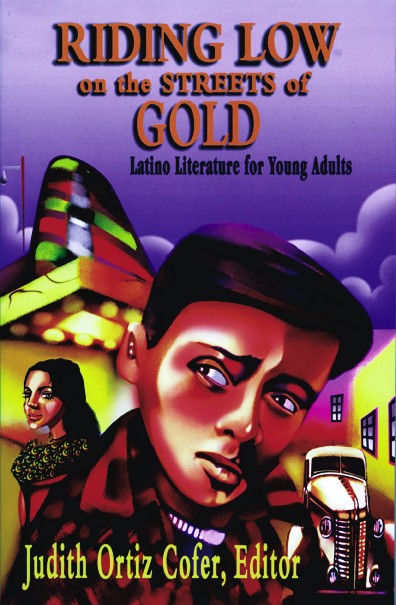Riding Low on the Streets of Gold: Latino Literature for Young Adults
$14.95
An essential collection of stories and poems introducing young people to U.S. Latino Literature.
Edited by Judith Ortiz Cofer
ISBN: 978-1-55885-380-5
Publication Date: October 31, 2003
Format: Trade Paperback
Pages: 207
Imprint: Piñata Books
Ages: 11 and up
Available
“There seemed to be no way out of the custom. Her arguments were always the same and always turned into pleas. . . ‘But, Amá, it’s embarrassing. I’m too old for that. I’m an adult,’” Naomi says in Helena María Viramontes’ story “Growing.” Ever since Naomi hit high school and puberty, she noticed “There were too many expectations, and no one instructed her on how to fulfill them . . .” In her tradition-bound family and under the thundering brow of her father, Naomi struggles to stretch the limitations imposed by her family, even as her flesh stretches in her changing body.
Like “Growing,” the pieces in this anthology for young adults bear the twists and pulls of youth: the struggles of discovering a new self and the trials of leaving behind an old one. This beautiful collection gathers a wealth of pieces well chosen for young adults: stories and poems that are studded with the challenges of negotiating identity and learning to love the bodies and worlds in which young adults find themselves.
Edited by well-known poet and essayist Judith Ortiz Cofer, the collection includes work by some of the leading writers for young adults like Pat Mora and Nicholasa Mohr, by such celebrated writers as Tomás Rivera, Virgil Suárez, Jesús Salvador Treviño, Lorna Dee Cervantes and Viramontes, as well as some new voices that will become a part of the literary canon of the twenty-first century. For many students across the U.S., this text will serve as the first introduction into these diverse writers and U.S. Hispanic literature.
“Naomi wondered why things were always so complicated once you became older,” writes Viramontes. In this text, some of the outstanding figures in contemporary Latino literature tackle these complicated questions.









